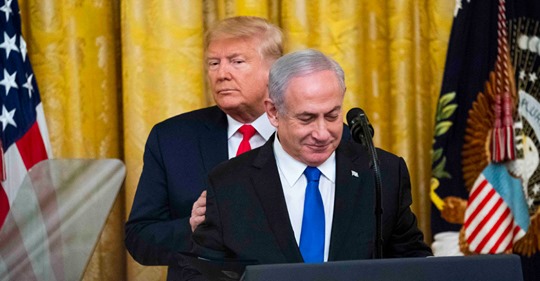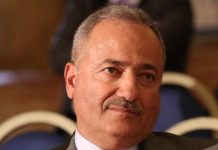The Tentative Israeli-Palestinian Peace Plan and its Postulations
Charles Elias Chartouni/January 30/2020
شارل الياس شرتوني: خطة السلام الإسرائيلية الفلسطينية المقترحة ومفترضاتها
Far from being a surprise, the adumbrations which preceded the release of the long awaited peace plan-drafted by the team commissioned by President Trump- were quite instructive about the unveiled final version.
Otherwise, the endorsement of the proclamation of Jerusalem as the undivided capital of Israel, the transfer of the American embassy, and the blatant support of the Likud policies were, by and large, indicative of the clauses outlined in this peace proposal.
What’s new is the endorsement of the Two States solution, the freezing of Israel’s colonization plans in the West Bank for four years, and the chances of contestation it offers the Palestinians, if they would ever engage this process, and the important financial offer ( 50 billion US dolllars ) to leverage Palestinian Nation-State building and developmental policies.
The question which pops up at this juncture is whether Palestinians are eager to renounce their initial reservation, let alone boycott of the current administration, and seize the opportunity offered by this plan, to set a platform of negotiation and reengage the US administration and the Israelis, or they are going to stick to their initial obstructionism, and move forward towards relinquishing the Oslo agreement.
Otherwise, are they able to overcome their internal rifts, build a working consensus among the different ailes of the Palestinian national movement and engage a different course of negotiations, at a time when their options are quite limited in an imploding Middle East, under the pressure of clashing international and regional power rivalries, and the conventional manipulation of the Palestinian political landscape by the contending Muslim and Arab power brokers. The endemic handicap of Palestinian politics lies in its inability to overcome enduring political stonewalling ( لا صلح، لا تفاوض، لا اعتراف، no peace, no negotiation, no recognition ), in spite of a legacy of indirect and direct negotiations which led to mutual recognition, working peace negotiations, and the formation of the Palestinian National Authority in the West Bank.
The stalled decade between 2010-2020, should not serve as a template for future political posturing and portend the demise of diplomatic overtures, however intricate they might be.
As for the Israelis they are challenged, on their turn, to overcome a legacy of deliberate circumvention towards an operative Israeli-Palestinian partnership towards peace making, unilateral policy crafting, and the fostering of an autistic approach to their relationships with the Palestinians.
The political wisdom which guided the founding fathers of the State of Israel who engaged in informal and formal diplomacy all their Arab neighbors, before and after its emergence, with a firm intention on finding a sustainable solution to the long hauled conflict, should serve as model which replaces the gridlocked policies of national irredentism promoted by nationalist parties and messianic political movements.
The question to be raised at this stage, is whether Benjamin Netanyahu is willing to swear off his expansionist drive if he ever gets elected, and whether Benny Gantz would be able to uphold his commitment to a negotiated and consensual approach to peace making, as he stated after the release of the US peace proposal.
Departing from the customary diplomacy of equanimous arbitration and institutional mediation, President Trump is offering a new platform of negotiation that could be readily rejected by the different Palestinian factions, and embraced by wide constituencies in Israel, but this would disservice the cause of peace if the two entities are unwilling to jump start a new stage of arduous conflict resolution which puts an end to a thwarted dynamic.
Palestinians cannot linger in their everlasting victimization pathos and delirious dream of annihilating the State of Israel over time, and Israelis have to adjust to the idea of normalization of their status in a, so far, hostile vicinity. The burden of the past, the impact of radical worldviews on both sides, the legitimate existential fears of the Israelis, the historical grievances of the Palestinians, the imploded regional environment with its cohort of Islamic radicalism, fermenting animosities and brutal power politics are weighing heavily on the eventual new course.
The Palestinian authority ill advised boycott of the Trump administration is unaffordable, especially, if the incumbent President gets re-elected, it’s about time for the Palestinians to overcome their political stunted growth and usher a new era of constructive engagement. Israelis have to face up to their immediate neighborhood, address it directly as a better means to deal with their legitimate security concerns.
Otherwise, the US administration has to find its way back to fair arbitraging and setting in motion a comprehensive and inclusive peace plan, which helps this whole region extract itself from the subjugation of convoluted conflicts, Islamic extremism, endemic developmental stagnation and cynical dictatorships.
The Israeli-Palestinian peace plan unveiled by President Trump and Prime Minister Benjamin Netanyahu sounds more like a road map for their own futures than for the Middle East.






















